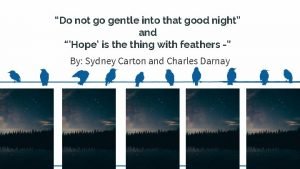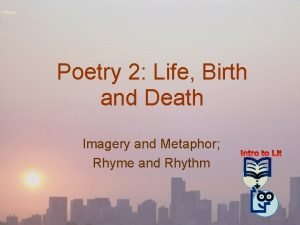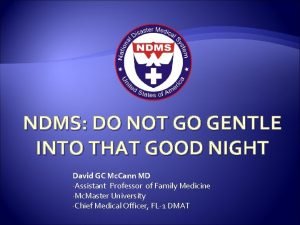LITERATUREINENGLISH DO NOT GO GENTLE INTO THAT GOOD











- Slides: 11

LITERATURE-IN-ENGLISH “DO NOT GO GENTLE INTO THAT GOOD NIGHT” DYLAN THOMAS FIRST PRESENTATION ANALYSIS OF THE POEM FORM TWO BY; AGYEMANG KWADWO RANSFORD

INTRODUCTION § The poem is a son's plea to a dying father. § His purpose is to show his father that all men face the same end, § but they fight for life, nonetheless.

STANZA ONE § struggle with death § no mute tolerance of death § night : metaphorically means death § unknown listener is told to rebel with: Ø anger Ø power and Ø madness § aging and death: peaceful dying § but the poet presents contrary view

§ STANZA TWO death figured as the “dark. ” § death is inevitable and certain § man not to submit to it § “forked no lightning”: something amazing § dying old men need to accomplish something remarkable § Hence to rebel against death.

Stanza three § The third stanza of this poem generates vivid imagery. § “good men”: good people also face death § “Last wave” : the most recent generation death is like to crashing of sea waves. § “green” of the bay signifies life, § the dying men cry out: they could have completed, their if allowed. § Hence, they must rage against death.

STANZA FOUR § Wild men have learned too late that they are mortal. § spent their lives in action and only realize the end. § “Wild men who caught and sang the sun in flight, ”: § Only realize that they have wasted away their days.

CONT. § “caught and sang the sun, ” (life of wild men). § They were risk-takers with peaceful ignorance. § They wasted away their lives on adventures. § They grieve: led life of folly. § Do not realize the end, still enjoy life: youthful

STANZA FIVE § Grave men: last group. § They near death or distressed (13). § They feel the strains of a long life, § know they are physically decaying. § Their eyes are falling § still craving for an existence (14) Øbelieves even in this frail state his father could be happy living longer.

STANZA SIX § The poet presents his intent. § He shows that all men fight for more time. § He urges his father to do the same. § He begs his father not to die.

CONT. § He sees his father fade § He begs his father not to give in. § His father has peacefully surrendered himself, § or has resigned himself to his fate.

THANK YOU
 Do not go gentle into that good night sparknotes
Do not go gentle into that good night sparknotes Do not go gentle into that good night meaning
Do not go gentle into that good night meaning Personification in do not go gentle into that good night
Personification in do not go gentle into that good night Do not go gentle into that good night paraphrase
Do not go gentle into that good night paraphrase Do not go gentle into that good night metaphors
Do not go gentle into that good night metaphors Do not go gentle into that good night nazi
Do not go gentle into that good night nazi Romeo and juliet quotes
Romeo and juliet quotes Romeo and juliet board game
Romeo and juliet board game Phân độ lown ngoại tâm thu
Phân độ lown ngoại tâm thu Block nhĩ thất độ 3
Block nhĩ thất độ 3 Thể thơ truyền thống
Thể thơ truyền thống Thơ thất ngôn tứ tuyệt đường luật
Thơ thất ngôn tứ tuyệt đường luật
















